| Gemstone Chart |
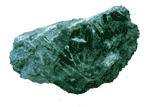 Natural Actinolite Natural Actinolite
Actinolite is a natural mineral with the chemical formula Ca2(Mg,Fe)5Si8O22(OH)2.the crystals have a hardness of 5.5 on Moh¡¯s scale, and there are two directions of cleavage. Natural actinolite is semi-precious to precious stone used in jewelry and other adornments.
Color: Green, Brown
Categories: semi-precious stone
Chemical Composition: Amphibole Group
Crystal Group: Monoclinic
Refractive Index: 1.620 - 1.642
Hardness: 5.5
Density: 3.05
Occurrence: Tanzania
| 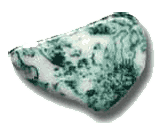 Natural Agate Natural Agate
Agate is a beautiful natural chalcedony stone, classified as a semi precious gem and has been used by people as early as the ancient Egyptians in and before 3000 BC! Agate is hard and tough enough to be incorporated into jewelry and other ornamental items.
Color: Blue, green, yellow,orange, brown, gray
Categories: semi-precious stone
Chemical Composition: SiO2
Crystal Group: Hexagonal
Refractive Index: 1.530 - 1.539
Hardness: 6.5 - 7
Density: 2.57 - 2.64
Occurrence: Scotland, U.S.A., India, England, Italy, Brazil, Uruguay, Germany, Egypt, Indonesia, and many other localities.
| 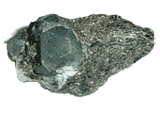 Natural Alexandrite Natural Alexandrite
Alexandrite was discovered in 1830 in the Ural mountains of Russia. Alexandrite is also found in Sri Lanka, Brazil, India, Tanzania, Zimbabwe, and most recently in Madagascar. The alexandrite variety of chrysoberyl is one of the rarest and most sought after of all gems.
Color: changing from green to red
Categories: semi-precious stone
Chemical Composition: BeAl2O4
Crystal Group: Orthorhombic
Refractive Index: 1.741 - 1.760
Hardness: 8.50
Density: 3.73
Occurrence: Tanzania, India, Russia, Madagascar, Sri Lanka, Zimbabwe, Zambia
| 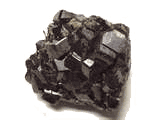 Natural Andradite Natural Andradite
Andradite is a Garnet, belonging to the Garnet group. It has the most powerful luster of any garnet, and this makes it a reputable gem.
Color: brown, greenish brown, yellowish green, green
Categories: semi-precious stone
Chemical Composition: Ca3Fe2(SiO4)3
Crystal Group: Cubic
Refractive Index: 3.82 ¨C 3.85
Hardness: 6.5
Density: 1.888 ¨C 1.889
Occurrence: Mexico, Korea, Namibia, Russia, Iran, South Africa
| 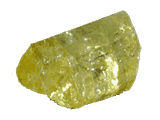 Natural Apatite Natural Apatite
Apatite displays strong fluorescence under short wave ultra-violet light. There is a particularly intense and deeply saturated, geenish-blue (aka swiss blue) variety from Madagascar known as "Neon Apatite" that is becoming quite popular in the gem trade.
Color: yellow, green, below, violet
Categories: semi-precious stone
Chemical Composition: Phosphate group
Crystal Group: Hexagonal
Refractive Index: 1.63-1.64
Hardness: 5
Density: 3.17-3.23
Occurrence: Burma, Ceylon, Madagascar, Mexico, Canada, India
| 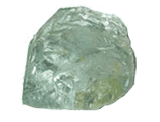 Natural Aquamarine Natural Aquamarine
Aquamarine is a semi-precious gemstone frequently incorporated into some of the most modern, beautiful handmade jewelry in the world. It is most often found in shades of clear ocean blue, and is widely recognized as the March Birthstone and the gemstone for the 18th anniversary.
Color: Blue, Green-blue
Categories: semi-precious stone
Chemical Composition: Be3Al2(SiO3)6
Crystal Group: Hexagonal
Refractive Index: 1.577(+-.016), 1.583 (+-.017)
Hardness: 7.5
Density: 2.67-2.745
Occurrence: Brazil, China, India, Madagascar, Mozambique, Russia, and U.S.A.
| 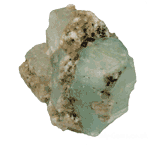 Natural Beryl Natural Beryl
Beryl is a semi-precious clear gemstone which usually comes in greens, yellows, and occasionally pinks, ands various shades thereof.
Color: Green, blue, pink, yellow, red
Categories: semi-precious stone
Chemical Composition: Be3Al2(SiO3)6
Crystal Group: Hexagonal
Refractive Index: 1.577(+-.016), 1.583 (+-.017)
Hardness: 7.5
Density: 2.67-2.745
Occurrence: Austria, Columbia, Brazil, Russia, East Africa, Australia, Madagascar, South Africa, Zimbabwe, India, Pakistan, Zambia, Nigeria, U.S.A., Afghanistan
| 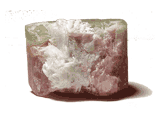 Natural Bi Color Tourmaline Natural Bi Color Tourmaline
Bi color tourmaline is the name given to tourmaline which displays more than one color in the same cystal.It is classified as a semi-precious stone.
Color: Green, red, yellow, orange. Brown, green, pink
Categories: semi-precious stone
Chemical Composition: (NaCa)(LI,MgFe,Al)9B3Si6(O,OH)31
Crystal Group: Hexagonal
Refractive Index: 1.624(+.005, -.005) - 1.644(+.006, -.006)
Hardness: 7-7.5
Density: 3.06 (.05, +.15)
Occurrence: East Africa, Brazil, USA, Afghanistan, Nigeria, Madagascar
|
|
